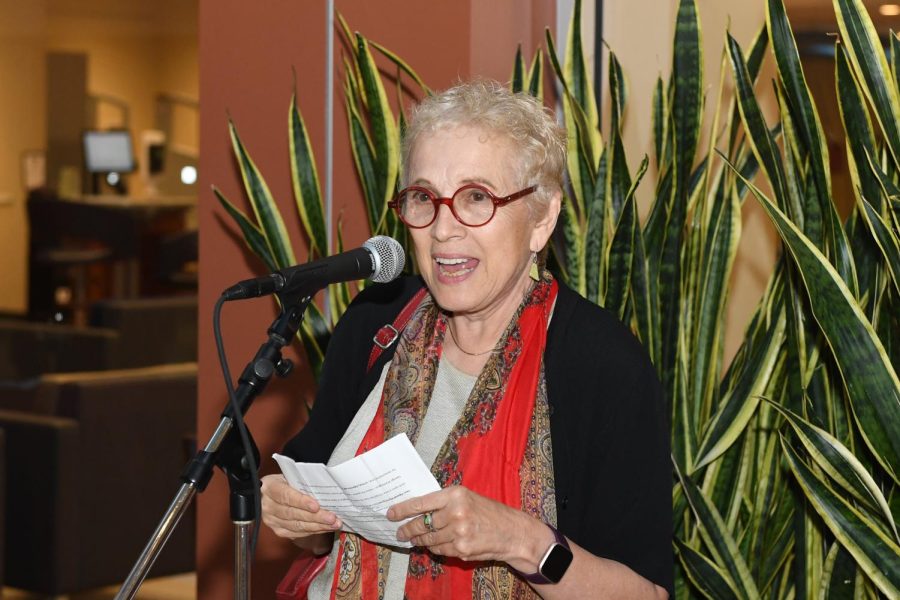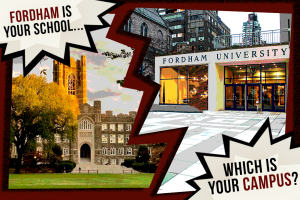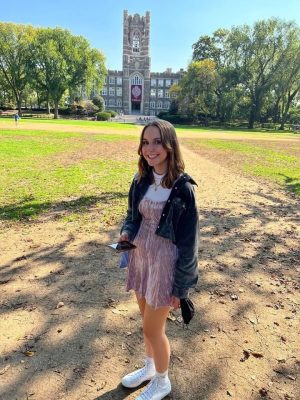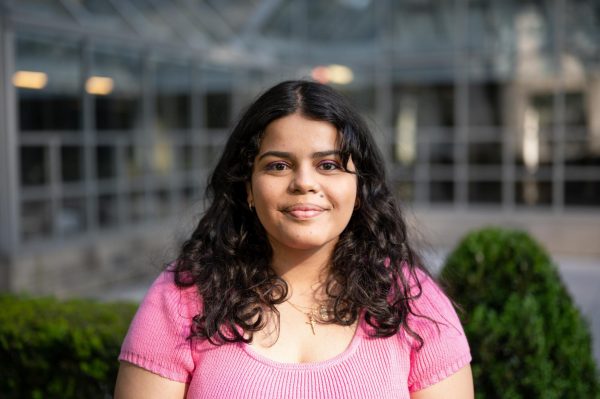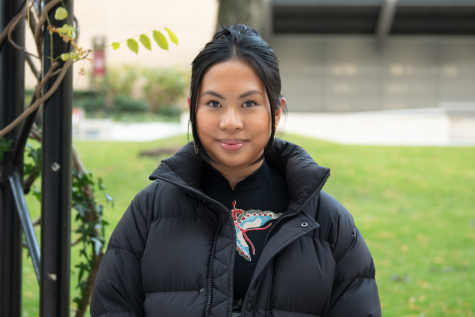Fordham Professor Announces Award for Undergraduate Paper’s Staff
The Elizabeth E. Stone ‘Many Voices’ Observer Award hopes to uplift student-journalists who belong to underrepresented groups and contribute to The Observer
COURTESY OF CHRIS TAGGART
Stone first announced the award during a speech at an Observer alumni reception on June 9.
August 27, 2022
CORRECTION: A previous version of this article referred to the Many Voices Observer Award as a “scholarship.” As of Aug. 31, 2022, the article has been updated to refer to it solely as an award.
Elizabeth Stone, founding and former adviser to The Observer and current professor of English at Fordham, announced on June 9 that she is creating an award in her name that is intended to increase diversity efforts and hopes to bring reporters from underrepresented communities to work on the paper.
Stone first publicized the award at a special Fordham Observer Alumni gathering in Platt Court held during the alumni Block Party at the Lincoln Center campus. In her speech at the reception, Stone mentioned that the inspiration for this award comes from a staff editorial published by The Observer in 2020, in which the paper acknowledged its staff’s lack of diversity.
“Right now, democracy is in big trouble, a trouble due to too many lies and too much silence, because not everyone who should be at the table is at the table,” she said.
Stone added that advising The Observer was the most gratifying part of her years at Fordham. She helped found the undergraduate newspaper in 1981 after a group of students approached her with the idea for what would later become the College at Lincoln Center’s campus paper. She is the current adviser to The Comma, Fordham’s creative literature magazine which used to publish its work within The Observer before moving toward self-publication.
Stone expressed that her intention is to nourish the strength and excellence of the paper’s future generations of writers, photographers, videographers, podcasters, designers and editors.
“Each generation embraced innovation, let go of what no longer served, and deepened the parts of its culture and traditions that anchored it and provided for its continuity,” she said.
The Inspiration Behind the Award
In a recent interview with The Observer, Stone said that she always knew she wanted to do something for the paper to increase diverse points of view for political opinion pieces. She was so sure of her desire to create a prize that she made an arrangement around 10 years ago with Fordham for a sum of money to go to The Observer.
She mentioned that she would have released the award after she retired but she wanted the award’s announcement to fall under former University President Rev. Joseph M. McShane, S.J.,’s presidency, who left office on June 30, 2022. Stone knew that McShane was a fan of The Observer and was supportive of her, which pushed her to release the award under his administration.
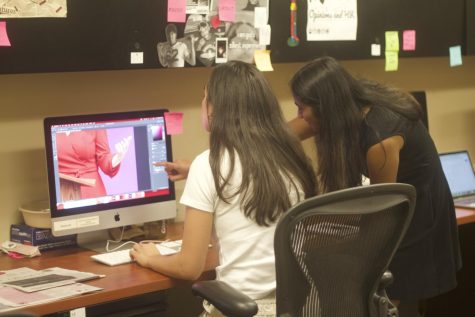
As a first-generation student herself, she also mentioned the impact that the prize would have had on her if she had been a student when it was developed.
“Had I gone to Fordham, I would have been eligible for that award,” Stone said. “As a first generation student, and as the granddaughter of immigrants, I would have written about myself ethnically, and that is what I did as a young writer.”
Although it is not a requirement for students who qualify for the award to write about themselves or write about their experiences, she encourages them to do so.
Stone added that she was essentially repaying the discounted tuition her son paid when he attended Fordham College at Rose Hill and was putting it toward the award’s fund.
“I always figured I had three children,” she said with a smile. “My two sons and The Observer.”
Editorial Board Members Speak on Award’s Intentions
The Observer’s editorial board is composed of 41 editors across digital and print sections who work to produce print versions of the paper on a biweekly schedule. The award is open to those members as well as its contributors who have composed at least three works for the paper in the form of photo projects or articles.
Shelby Williams, Fordham College at Lincoln Center (FCLC) ’25 and an assistant copy editor at The Observer, spoke about how open the publication is to receiving new voices and new staff members. She believes that the prize will provide student-journalists with the resources to grow themselves, further their education and strengthen what they have to be able to ensure that the paper is doing all it can to represent the Fordham community.
“When you don’t have a lot of diversity of people, I think that really limits how far we can go as an organization, and it also really limits our ability to sometimes represent the perspective of the entire student population.” Shaily Jani, GSBLC ’23
Shaily Jani, Gabelli School of Business at Lincoln Center ’23 and a podcast co-host at The Observer, agreed that having this incentive is going to help increase the publication’s diversity. When asked about diversity and The Observer, Jani noted that she thinks about the fact that there are very few people of color on the paper.
“When you don’t have a lot of diversity of people, I think that really limits how far we can go as an organization, and it also really limits our ability to sometimes represent the perspective of the entire student population,” she said.
Jani emphasized that especially at predominantly white institutions like Fordham, representation is really important.
“As a person of color, if I want to join a certain organization and I don’t see a lot of people that look like me or it’s overwhelmingly white, sometimes it does make you kind of hesitate,” she said.
“I think the best tradition that she started was really just making the students at The Observer feel that they were independent and in control of the content that they published.” Anthony Hazell, FCLC ’07 and former editor-in-chief of The Observer
Jani said that she believes if the general student body is aware of the Many Voices Observer Award, then, over time, it would increase the diversity of the paper. She does not think that the presence of the award will increase diversity on its own.
She added that diversity is not just having people of color present, but also having them be engaged in the decision-making process and contribute to what the organization is putting out. She noted that it should not be performative and should aid in representing the entire student population.
Award’s Advisory Board Expresses Its Excitement
Anthony Hazell, FCLC ’07, former editor-in-chief of The Observer, former adviser to The Observer and the chair of the award’s advisory board, spoke kindly about Stone’s legacy with the student paper and mentioned her ability to encourage students to set a higher bar for themselves in an interview with The Observer in 2021.
“I think the best tradition that she started was really just making the students at The Observer feel that they were independent and in control of the content that they published,” Hazell told The Observer.
The award’s advisory board is composed of selected alumni, The Observer’s editor-in-chief and managing editor, and a representative from Student Affairs. Both Stone and Hazell hope that the advisory board becomes an active part of the Observer Alumni Affinity Chapter and will be a liaison between current students and alumni.
“I think that this is a great step in the right direction for diversity and for The Observer.” Colin Sheeley, FCLC ’19 and former editor-in-chief of The Observer
In a recent interview with The Observer, Hazell spoke on his communications with Stone and when she had first told him about her plans for the prize. He noted that he was both surprised and not surprised because Stone often describes the paper as the most gratifying part of her career at Fordham, so he could envision her wanting to do something that would have a lasting impact on the paper’s future.
“What did surprise me is that, even in the years that have passed since she was advisor to The Observer, she still has her finger on the pulse of what will make student-journalism better and more relevant to the campus community,” he said.
Colin Sheeley, FCLC ’19 and former editor-in-chief of The Observer, received an email from Hazell in March with information about the award and an invitation to join its advisory board. Sheeley noted that he was very impressed with the fundraising and scholarship opportunities the paper has been able to generate in the span of a few years.
“I think that this is a great step in the right direction for diversity and for The Observer,” he said.
He added that this scholarship addresses that students who have the ability to put in hours and hours of unpaid labor into a newspaper tend to be white students who don’t have to rely on a second job or take care of responsibilities outside of school. He has always felt that the newsroom of The Observer has struggled with diversity in some respects and is reflective of Fordham Lincoln Center’s demographics.
“It was always my goal when I was editor to try to gather as many voices as we could,” he said. “I would say that this scholarship is the most direct action that we have taken in that respect.”
Sheeley believes that this award, as well as The Observer’s independent $1,500 scholarship, can foster an endowment that will transform the paper into an even more professional, independent and successful college newspaper.
Allie Stofer, FCLC ’23 and The Observer’s current editor-in-chief, and Maddie Sandholm, FCLC ’23 and the managing editor, had a meeting with Stone and Hazell in early May to discuss what the scholarship would look like and the details surrounding its release.
“I was just excited that we have a way to increase our diversity efforts besides just reaching out to people because having that monetary aspect is very helpful.” Allie Stofer, FCLC ’23 and editor-in-chief at The Observer
According to Stofer, she and Sandholm had been prioritizing increasing diversity efforts prior to the meeting, and she was excited to hear about the award.
“I was just excited that we have a way to increase our diversity efforts besides just reaching out to people because having that monetary aspect is very helpful,” Stofer said.
Stofer cited that one of the reasons The Observer is not a diverse publication is because more people tend to join the club through their friends. She added that she is interested in more outreach, such as visiting other classes or reaching out to other clubs, and being purposeful with trying to reach out to the voices that the paper is lacking.
The editor-in-chief feels that the award is going to help increase diversity efforts and hopes that it will allow more people to make the time commitment that The Observer requires.
“It takes up a lot of time to be a part of The Observer, which people don’t have because it is a club, and it’s unpaid,” she said. “So by being able to offer this I think it’ll be very helpful.”
“The Observer is always striving to be the student voice of Lincoln Center, and we cannot be that if all students do not feel represented.” Maddie Sandholm, FCLC ’23 and managing editor at The Observer
Sandholm said that she hopes the award will encourage students to make their voices heard and to celebrate journalists and other members of The Observer community, which would fulfill Stone’s mission. Sandholm noted that speaking with Stone about her time with the paper was a wonderful experience because Stone spent so long mentoring previous Observer generations.
She also spoke on how invaluable the prize is for The Observer and how diversity has been something the paper has been working toward.
“The Observer is always striving to be the student voice of Lincoln Center, and we cannot be that if all students do not feel represented,” Sandholm said. “It is one of the goals of The Observer that all students feel supported in sharing their voice with the Fordham community and beyond.”
Logistics, Eligibility and the Award’s Projected Release
The first prizes will be awarded in 2023 with what is currently projected to be one award. Student-journalists who belong to historically underrepresented groups in higher education and have contributed at least three works to The Observer, otherwise considered as members of the paper’s staff, are eligible for the award. According to Stone, the prizes within the award are expected to be at least $1,500, with the discretion of who will receive the reward left to the award’s advisory board.
In her speech at the alumni reception, Stone noted that journalism is at its best when it is most inclusive of diverse voices and expressed her hopes for the prize: to bring new and underrepresented voices to The Observer and to add fundraising and alumni contributions to expand the award’s fund, allowing for additional prizes in the years to come.
“What I’m really trying to do is — get ready — encourage many voices,” she told The Observer. “Hence the name.”

